
Dental Implants — Jacksonville, FL
A Permanent Solution to Missing Teeth
While traditional tooth replacements only simulate a new tooth, dental implants are currently the only treatment that brings back the entire dental structure, including the visible crown and supporting root. The end result is a prosthetic that resembles nature in every way you can imagine, including looks, strength, and durability. The team at Carlson Dental Group on Bartram Park can use this treatment to bring back any number of teeth for a lifetime, so if you’re ready to put your tooth loss behind you permanently, contact us today to get started with dental implants in Jacksonville, FL.

Why Choose Carlson Dental Group for Dental Implants?
- Expert Dentists Place and Restore Dental Implants In-Office
- Modern Dental Technology Utilized for Enhanced Planning
- Multiple Financing Options and Transparent Fees
What Are Dental Implants?

A dental implant is actually a small titanium post that is placed directly into the jawbone where a real tooth used to reside. There, it bonds to the surrounding bone, essentially becoming a brand new root. This is then topped with a patient’s replacement teeth. Because implants have roots just like real teeth, they are much more stable compared to regular prosthetics, and they also appear more natural within the smile. If you want a truly long-term solution for your missing tooth (or teeth), dental implants are capable of lasting for decades and even for life when properly taken care of!
The 4-Step Dental Implant Process
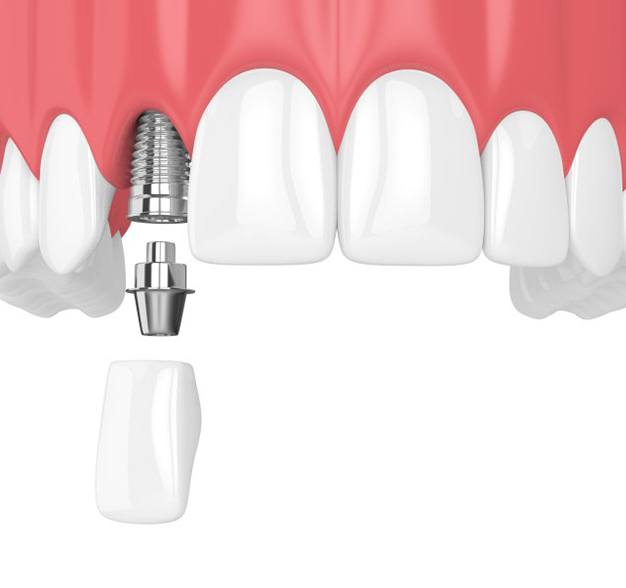
If you visit a typical dental office in Jacksonville, they will send you to an outside specialist to have your implant roots surgically placed into your jawbone. This adds a lot of time and expense to the process of rebuilding your smile, which is why we prefer to do everything ourselves here at Carlson Dental Group. Our team has placed and restored hundreds of implants over the years, allowing our patients to get what they need while working with the same trusted dentist and team every step of the way. Here’s what you can expect from the dental implant process.
Initial Dental Implant Consultation
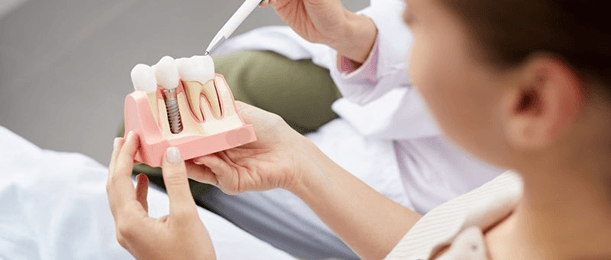
Receiving dental implants takes several appointments over a few months. The very first part of the process involves the initial consultation. During this visit, we’ll evaluate your oral health and determine if you’re eligible for the treatment. We’ll also take detailed X-rays to determine the exact placement of your implants. In some cases, we may decide that a preliminary procedure, like a bone graft or gum disease therapy, is necessary before implant placement.
Dental Implant Surgery

Next comes implant surgery, wherein tiny holes are made in your gums and jawbone, into which your implants are placed. Of course, our team will first numb your mouth completely with a local anesthetic to keep you pain-free and comfortable throughout your procedure. Your titanium posts will be placed at the pre-planned locations and angles with precision so that they’ll fit with the rest of your pearly whites. Afterward, we’ll suture your gums closed around the implants and cover them with protective caps so you can recover safely.
Dental Implant Osseointegration & Abutment
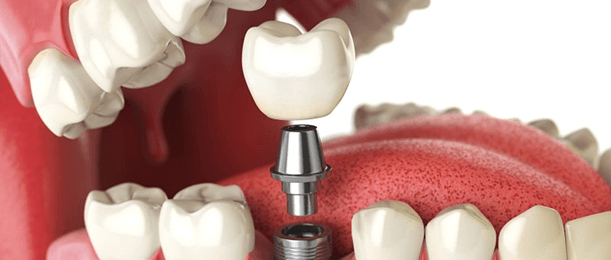
Over the next three to six months, the implants will integrate with your jawbone until they are essentially one and the same. This process—known as osseointegration—is what allows for the metal posts to provide the stability your new teeth will need to be sturdy and function naturally. Once this process is complete, you’ll undergo another minor surgery to install your abutments, or metal connector pieces that go on top of your implants.
Delivery of Dental Implant Restoration(s)

After you’ve recovered from getting your abutments, you’ll return to our office to finally receive your restoration, whether that be a crown, bridge, or denture. We will verify that your bite is comfortable and that you are completely satisfied with your treatment before sending you on your way to show off your brand-new smile.
Benefits of Dental Implants

The benefits of dental implants in Jacksonville are many. In fact, more than 5 million dental implants are placed each year because more and more people are discovering how transformative these permanent prosthetics truly are! At Carlson Dental Group, our team of experts can help you embrace a better quality of life and enjoy greater functionality that is unattainable with more traditional tooth replacement solutions. If you’re ready to experience a longer-lasting, more beautiful smile, contact us today to discuss the potential for dental implants.
Day-to-Day Benefits

- Teeth You Can Trust: With implants, you never have to worry about your new teeth moving out of place because they are held within thick jawbone just like your regular teeth. This allows you to eat the foods you love and never worry about a prosthetic that will slip or fall out (i.e., dentures).
- Beautiful Aesthetics: Dental implants in Jacksonville are made of high-quality materials and blend in with your existing, natural teeth.
- Easy to Maintain: Unlike traditional dentures that require soaking every night, your dental implants can be easily cleaned with a soft-bristled toothbrush, non-abrasive toothpaste, and regular dental floss. This makes it easier to maintain better oral health as a result.
- Living a Fuller Life: According to a study, Biting Into Denture Care, nearly 54% of denture-wearers worry about food getting stuck in their dentures. Another 34% admit their prosthetics keep them from living life to the fullest. With dental implants, you can freely eat, smile, and speak, allowing you to embrace a better quality of life and enjoy time spent around others.
Health Benefits
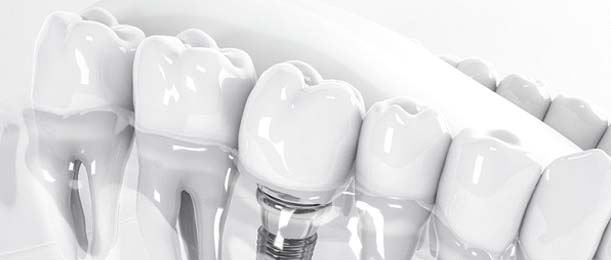
- Existing Teeth Remain Untouched: With a traditional dental bridge, your abutment teeth on either side of the gap must be altered to serve as anchors for your restoration. However, with dental implants, there’s no need to touch your healthy teeth because the posts are inserted into the existing socket and jawbone.
- Prevent Bone Loss: Dental implants can stop and even reverse the breakdown of the jawbone that usually occurs after tooth loss, which preserves a patient’s remaining teeth and helps them maintain a stronger jawline and more youthful appearance.
- Reduced Risk of Systemic Issues: Tooth loss is commonly linked to diabetes, heart disease, and osteoporosis. By seeing an implant dentist in Jacksonville to replace your missing teeth with dental implants, you can reduce your risk for worsening oral and overall health issues.
Long-Term Benefits

- High Success Rate: According to the American College of Prosthodontics, dental implants have a success rate of 98% depending on how well they’re taken care of and how well they’re put into place. After 10 years, the success rate is estimated between 90-95%.
- A Solution That Lasts: With proper care (regular brushing and flossing), dental implants have been shown to last 30+ years on average, though many endure for much longer.
- You Can Save Money in the Long Run: By choosing dental implants, you will surprisingly save more money in the long run by avoiding denture adhesives, frequent adjustments and replacements, and specialized cleaning supplies that are often required with dental bridges and dentures.
Who Dental Implants Can Help

Dental implants are a fantastic option for those missing any number of teeth. Whether you’ve recently lost a tooth or had missing teeth for years, there’s a good chance dental implants can help you!
Who Is a Good Candidate for Dental Implants?
All a patient needs in order to be a good candidate for dental implants is healthy gums and a jawbone strong enough to support the new roots. When these have been confirmed with an exam, our team can help a patient select which type of implant procedure best suits their needs.
Missing One Tooth
Instead of filing down healthy teeth to replace a missing one with a bridge, we can position an implant root topped with a crown and not have to alter the surrounding dental structure. The crown itself will be meticulously designed to perfectly mimic the teeth around it, both in color and shape.
Missing Multiple Teeth
Just one to two implants can be used to anchor a partial denture or bridge to the jawbone that brings back several teeth at once. Securing these prosthetics with implants makes them more stable, durable, and simpler to clean as well.
Missing All Teeth
If you’re sick of your denture constantly shifting, then dental implants can offer you the security your smile deserves. A full denture can be attached firmly to the jawbone using just four to six implants. These dentures not only allow a patient to have a stronger bite compared to traditional ones, but they also take up less room in the mouth, which provides a more comfortable fit.
Learn More About Implant Dentures
Understanding the Cost of Dental Implants

The price you pay for dental implants will be completely unique based on your specific situation, such as how many teeth you are missing, where they are located, and what type of restoration you want. Even though implants tend to be more expensive upfront compared to regular bridges and dentures, their longevity makes them one of the best investments in all of dentistry. Instead of getting a normal prosthetic and having to replace it numerous times over the years, a patient can have dental implants placed just once and end up saving thousands.
Types of Dental Implants

The primary factor in the cost of your dental implants will be how many teeth you need replaced. This will affect the kind of restoration you’ll receive. Luckily, dental implants can be used to treat any degree of tooth loss.
Are Dental Implants Worth the Investment?

Absolutely! While implants come with a higher initial price tag than other options, they also last significantly longer. Provided you take excellent care of your implants, they can potentially last upwards of 30 years, maybe even a lifetime. In comparison, you’d have to replace a traditional bridge or denture every few years, racking up costs that may eventually add up to more than the cost of implants. Save yourself time and money in the long run by investing in dental implants.
Does My Dental Insurance Cover Dental Implants?

Although many insurance companies won’t cover the cost of the implants themselves, they may provide coverage for other portions of your implant journey, such as your consultation, preliminary treatments, or your restoration. Our team is more than happy to file claims on your behalf and maximize your benefits.
Making Dental Implants Affordable

If you don’t have insurance, or if they won’t cover enough of the cost, we partner with CareCredit, a third-party financing option that allows you to fund your dental care with very little interest. We also offer an in-house membership plan. By simply paying an annual membership fee, you can receive discounts on virtually any dental procedure. To learn more about the cost of dental implants, or to schedule your implant consultation, give us a call today!
Dental Implant Technology

In addition to being able to provide the entire dental implant procedure in one location, we also ensure success for our patients by using our CBCT scanner to formulate extremely precise and personalized treatment plans. This 3D X-ray of the jaw and nearby oral structures allows us to find the perfect location for a patient’s implants and place them with unmatched accuracy.
Learn More About Our Advanced Dental Technology
Dental Implant Failure & Salvage

Dental implants have a great success rate of 95%! However, there is still a very small chance that you could experience a dental implant failure. If your newly restored smile is starting to feel uncomfortable, or you are beginning to worry about the state of your implants, give us a call! We may even be able to save your smile with a dental implant salvage treatment.
Learn More About Dental Implant Failure & Salvage
Dental Implant Post-Op Instructions

You won’t be done with implant treatment after the placement surgery. At that point, you must go through a crucial recovery period. This time allows your mouth to heal from the implant work. Still, you don’t need to worry – we’ll help you recover quickly and thoroughly. For that very reason, we’ve listed some helpful dental implant post-op instructions. By using them, you’ll know what to do to heal well. Read on to learn more, or call our office for relevant tips.
What to Do Directly After Dental Implant Surgery

Once implant surgery is over, you should leave the forming blood clot alone. Failing to do so will delay or even reverse your recovery. That being said, remember to follow the rules below:
- Don’t smoke on the first day after surgery.
- Don’t use drinking straws. (Their suction force might dislodge your blood clot.)
- Don’t spit. (If necessary, swallow your saliva or use a tissue for dabbing.)
- Keep your fingers and tongue away from the surgical site(s).
Common Side Effects When Recovering from Dental Implant Placement

You’re likely to endure some side effects after your implant placement. Typical symptoms you may face include:
- General Discomfort – Your mouth may ache when the surgery’s anesthesia fades. To compensate, take store-bought pain relievers.
- Intermittent bleeding – In the days after surgery, your treatment site may bleed slightly. You can lessen this effect with gauze and light pressure.
- Gum or Facial Swelling – Your face and gums could swell in the first 72 hours post-surgery. Manage it using a cold or warm compress.
Even if the signs manifest, know they’re temporary; they’ll go away soon enough. If that’s ever not the case, please let us know.
Your Diet After Dental Implant Surgery

It’s best if you eat soft, non-abrasive foods in the days after implant surgery. Chewing anything tough could dislodge your blood clot, cause pain, and delay your recovery.
Good examples of soft food to try are:
- Scrambled eggs
- Mashed potatoes
- Pasta
- (Non-hot) Soup
- Yogurt
- Pudding
- Ice cream
Once you feel up to it, you can resume your typical diet. That said, you should still limit crunchy and tough foods. Try not to chew directly on the implant site(s), either.
Post-Op Health & Oral Hygiene

Despite your need for recovery, your mouth still requires daily cleaning. That means you should continue practicing good oral hygiene. To ensure proper healing, you’ll just have to make a few changes.
For starters, keep brushing your teeth twice daily. This habit will prevent bacteria from nearing the treatment site. All the same, be gentle when your brush gets close to the surgical site. You don’t want to dislodge the blood clot.
You should also slightly change your mouth rinse approach. After all, a mouthwash with a high alcohol content will cause issues. So, perform a twice-daily rinse with saltwater for now. This method will reduce your post-surgery inflammation.
What to Do After Your New Teeth Are Attached

Things ought to be fine once your new crown, bridge, or denture is attached. You may face mild sensitivity, but you can manage this symptom with painkillers. Barring that effect, you likely won’t endure any unpleasant effects – abnormal swelling, bleeding, extensive recovery, etc. Put simply, you’ll be ready to show your full and pretty grin!
Maintaining & Caring for Your Dental Implants
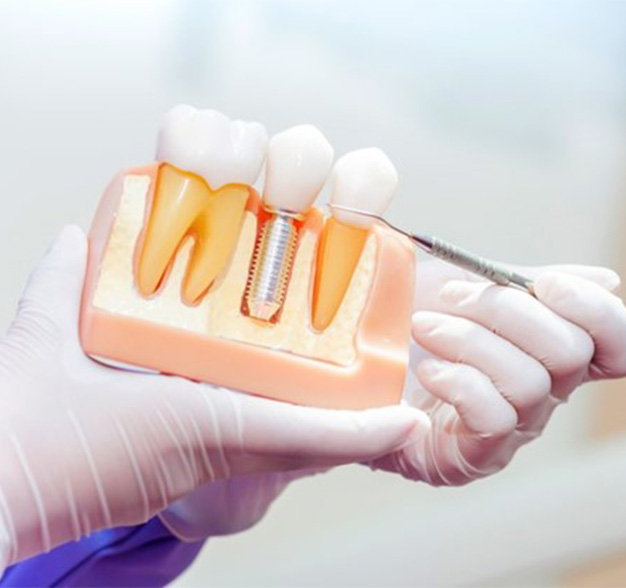
With a success rate of over 95%, it’s highly unlikely that your dental implants will fail. That said, they’ll still need to be taken care of just like your natural pearly whites. To make the most of your brand-new teeth, here are several important tips you should keep in mind when it comes to dental implant care.
Make Oral Hygiene a Priority

Dental implants can’t develop cavities, but this doesn’t mean the rest of your mouth will be completely immune. Your gums and any remaining natural teeth will still be susceptible to bacteria, so you’ll need to keep them clean every day. Make sure to brush, floss, and rinse with mouthwash daily to give your smile and dental implants a fighting chance.
Eat a Healthy Diet

While your dietary choices will expand because of the stability of your dental implants, it’s a good idea to include more nutritious foods in your meals. Try going for treats that are rich in calcium and vitamin C—as these will promote healthier and stronger gums and bone tissue. By doing so, you can help preserve the longevity of your dental implants while getting the nutrients you need for better overall health.
Break Bad Habits

Some oral habits can be detrimental to your smile if they aren’t addressed or kicked to the curb. Firstly, smoking or using tobacco products should be avoided entirely as they can increase the risk of dental implant failure as well as conditions like oral cancer. They can even negatively affect your immune system, making it more difficult for your body to fight off bacteria and infection. Be sure to refrain from using your teeth as tools, such as when opening a bottle or package, and try to keep tools handy instead.
Protect Your Dental Implants
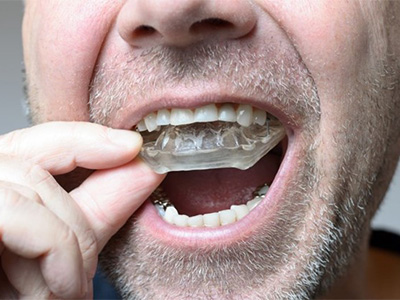
If you tend to clench or grind your teeth during sleep, then you might consider asking about nightguards for bruxism. Likewise, patients who participate in contact sports should also invest in custom mouthguards. These oral appliances can provide cushion and protection for your dental implants and the rest of your smile.
Schedule Regular Dental Checkups

Other than practicing regular oral hygiene, remember to visit your dentist every six months for checkups and cleanings. These appointments are perfect opportunities to monitor your oral health and dental implants while addressing any growing or underlying problems early on. With early prevention, you can increase the chance of maintaining and preserving your implants for the long run.
Dental Implant FAQs

Dental implants are an excellent tooth replacement option because they provide so many unique benefits, but it pays to be well informed. Here are the answers to some of the most common questions we are asked about dental implants in Jacksonville. If you don’t see the information that you’re looking for below, don’t worry! Just give us a call and we’d be happy to answer your questions and get you started with an initial consultation.
How Long Do Dental Implants Last?
This all depends on the health and lifestyle of the patient. To ensure that dental implants last, it’s important to brush, floss, and rinse with a mouthwash on a daily basis. Always attend regular cleanings and checkups, and avoid chewing on things that are particularly hard or sticky. With proper maintenance and care, dental implants can last upwards of 30 years! This is several times longer than the average traditional bridge or dentures.
Does Getting Dental Implants Hurt?
Your mouth will be numbed with a local anesthetic before the procedure begins, and you will most likely be sedated, so you shouldn’t feel any pain during the surgery. However, you may experience some soreness for a few days afterwards. To manage discomfort, take all prescribed and over-the-counter medication as directed. Cold compresses are also helpful when managing pain. If your discomfort worsens instead of improving after two or three days, give us a call so we can help!
Am I Too Young to Get Dental Implants?
Most people’s jaws aren’t completely developed until young adulthood. Some people’s aren’t fully grown until they are in their mid-20s, with men’s jaws taking longer on average than women’s. If dental implants are placed in a jaw before it has finished growing, this can interfere with further bone development and potentially result in complications in the future. Because of this, most dental professionals will not place implants in patients younger than 18.
How Long Does It Take to Recover from Dental Implant Surgery?
You should be able to resume your normal activities the day after your surgery. However, it’s a good idea to avoid strenuous exercise, as this can delay healing. Bleeding should stop after the first couple of days, and swelling should discontinue after about three to four days. Take all prescribed and over-the-counter medication as directed. It can take up to six months for your implants to fuse to the jawbone.